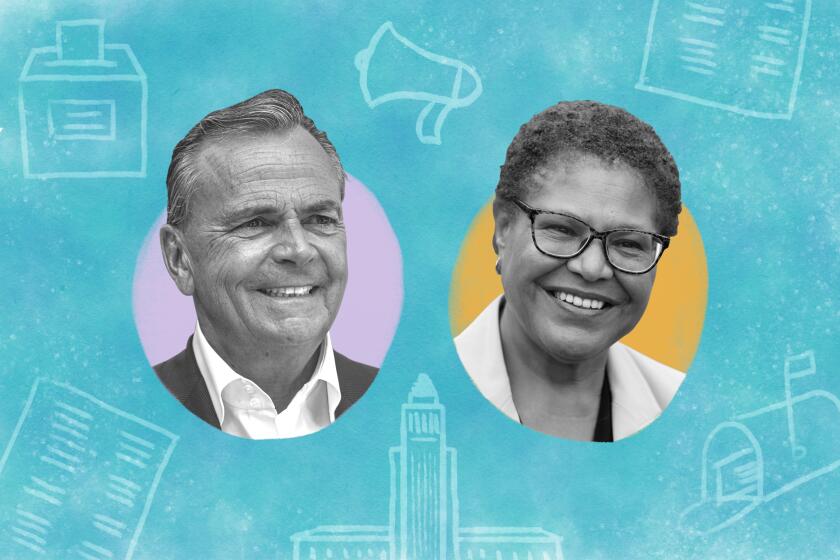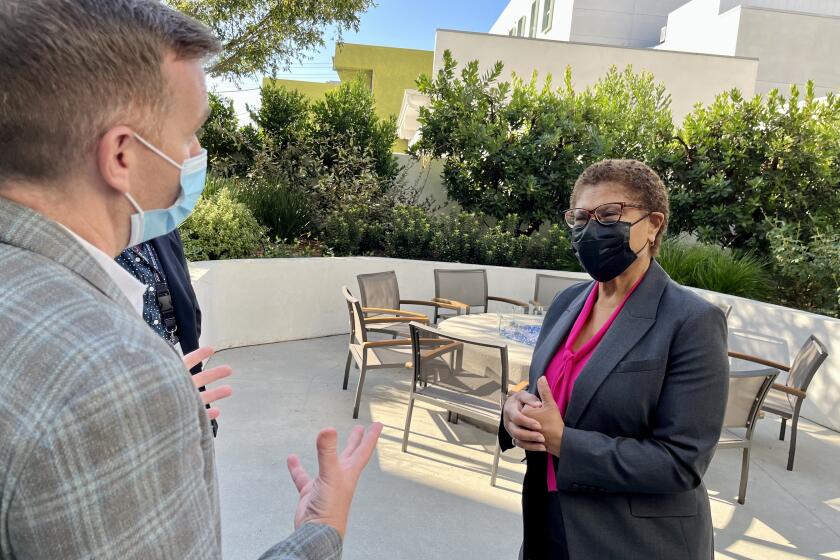Column: Bass or Caruso? Look at recent mayors for clues about the kind of leader L.A. needs now
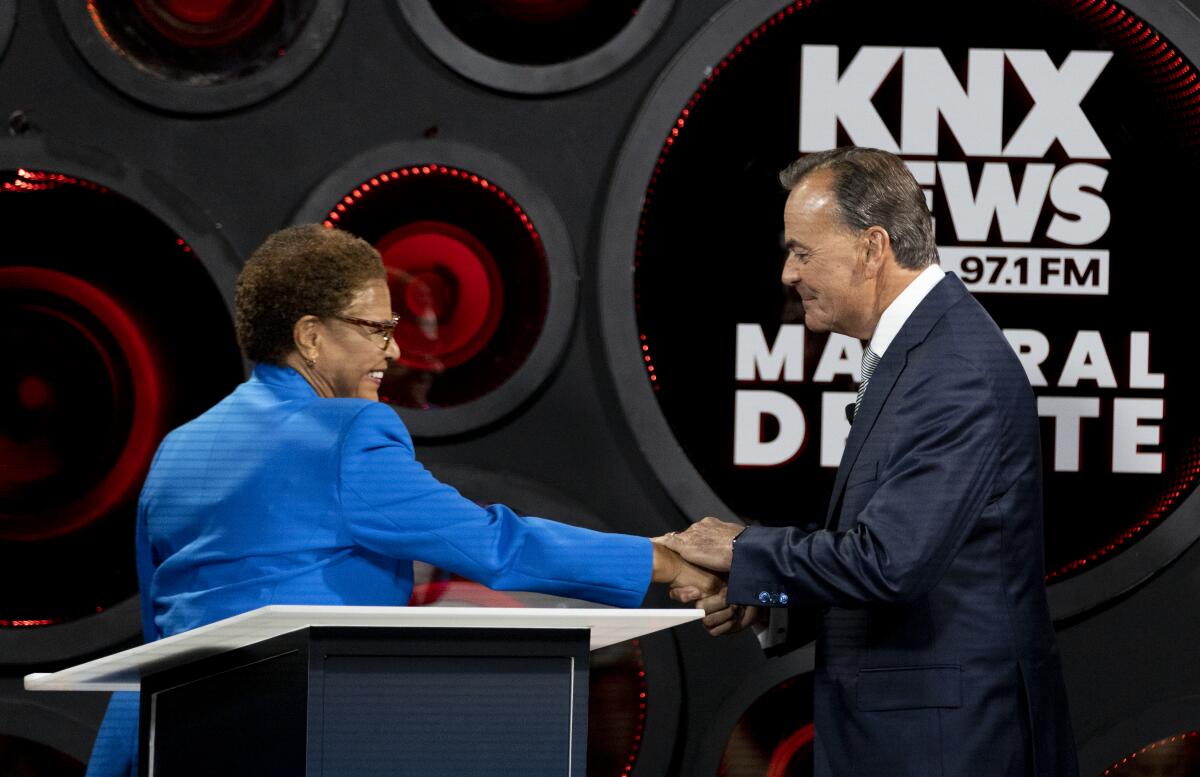
Los Angeles, a sprawling creation of great wonder and even greater challenges, is a month away from choosing its next leader, and voters have two starkly different candidates to choose from.
One’s a woman, one’s a man. One’s Black, one’s white. One’s a politician, one’s a businessman.
U.S. Rep. Karen Bass would be the city’s first female mayor. Developer Rick Caruso would be the first billionaire mayor.
The winner will affect the lives of 4 million residents a half-century after Tom Bradley began his first term in 1973. Bradley was followed by Richard Riordan, James Hahn, Antonio Villaraigosa and Eric Garcetti.
And next up?
“L.A. is very lucky to have two terrific candidates running for mayor,” said Bob Stern, longtime local watchdog, but he followed that up with a caveat. Election night might be a high point, Stern said, because “there is a real question whether either can be successful.”
I know in my head that he’s right, because goat herders have easier jobs. The city’s overwhelming problems — homelessness, lack of affordable housing, crime, poverty — are not easily solvable, especially given the fact that there’s little consensus on the fixes.
But in my heart and gut, I want to believe either Bass or Caruso will pull off the miracle each of them is promising and lead Los Angeles to a better place. The city is hungry, ready and overdue for a shakeup.
Rick Caruso and Karen Bass are running for Los Angeles mayor. Here is your guide to the race.
A few weeks ago, contemplating the near future of local leadership, I began asking political observers about the recent past. What do we know about personalities and strategies that worked — or didn’t? And what might that tell us about what to expect from the next mayor?
Bradley, a cop and councilman before becoming the city’s first and only Black mayor, won former Times columnist Bill Boyarsky’s respect by his blunt and direct manner, which Boyarsky got a taste of after writing things the mayor didn’t like.
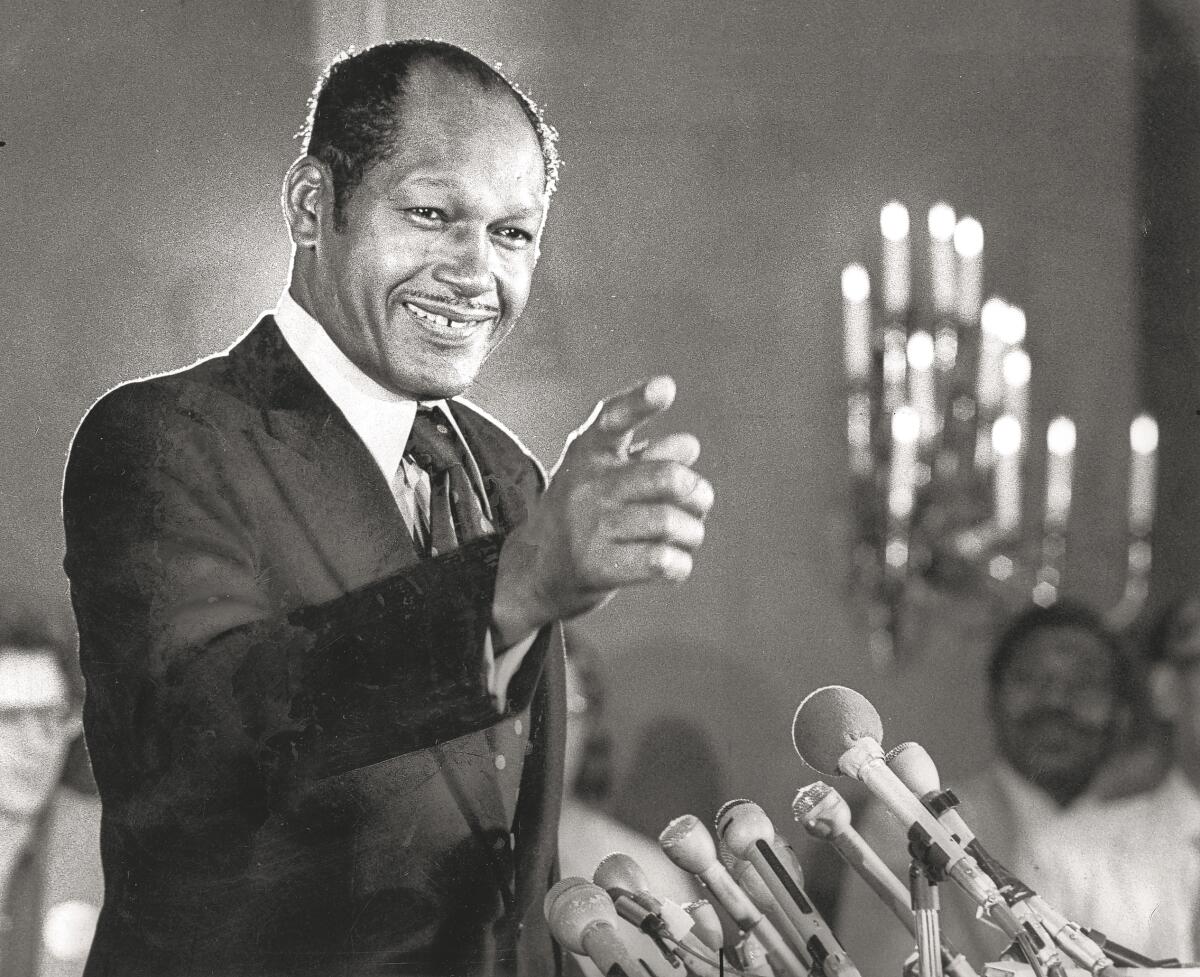
“He’d call me into his office and tell me. No whining to my boss,” Boyarsky said. “He became mayor of a city shattered by the Watts riots and helped bring peace. Big-picture guy. He envisioned the transit system being built today. Good lesson for the new mayor. Spare me tiny tech innovations and committees.”
Riordan, like Caruso, was a wealthy businessman who was convinced his success could be duplicated at City Hall.
“He benefited from the aftermath of the riots in 1991,” and his campaign message — “tough enough to turn L.A. around” — connected with voters, said Jaime Regalado, former director of the Pat Brown Institute at Cal State L.A. But Riordan’s strong personality and disdain for other city leaders didn’t always serve him well, Regalado added.
Hahn, who followed Riordan, knew the dull details of governance inside out, but struck me as more of an administrator than a leader. He didn’t love the spotlight, and I was never convinced he liked the job.
Then came Villaraigosa, a charismatic hustler who created friends and enemies and vowed to fix everything big and small (a style that guaranteed both success and failure). He joined me on skid row one night to say he’d tackle that problem as well, and he even attempted to take over the schools.
The current and outgoing mayor, Garcetti, will leave with a mixed report card; good on policy, not so good on follow-through or leadership, though he was a comfort when the pandemic was at its scariest. To his credit, he delivered results (on transit, water conservation and earthquake safety) that are either not remembered by most people or will always be overshadowed by the rise of homelessness on his watch.
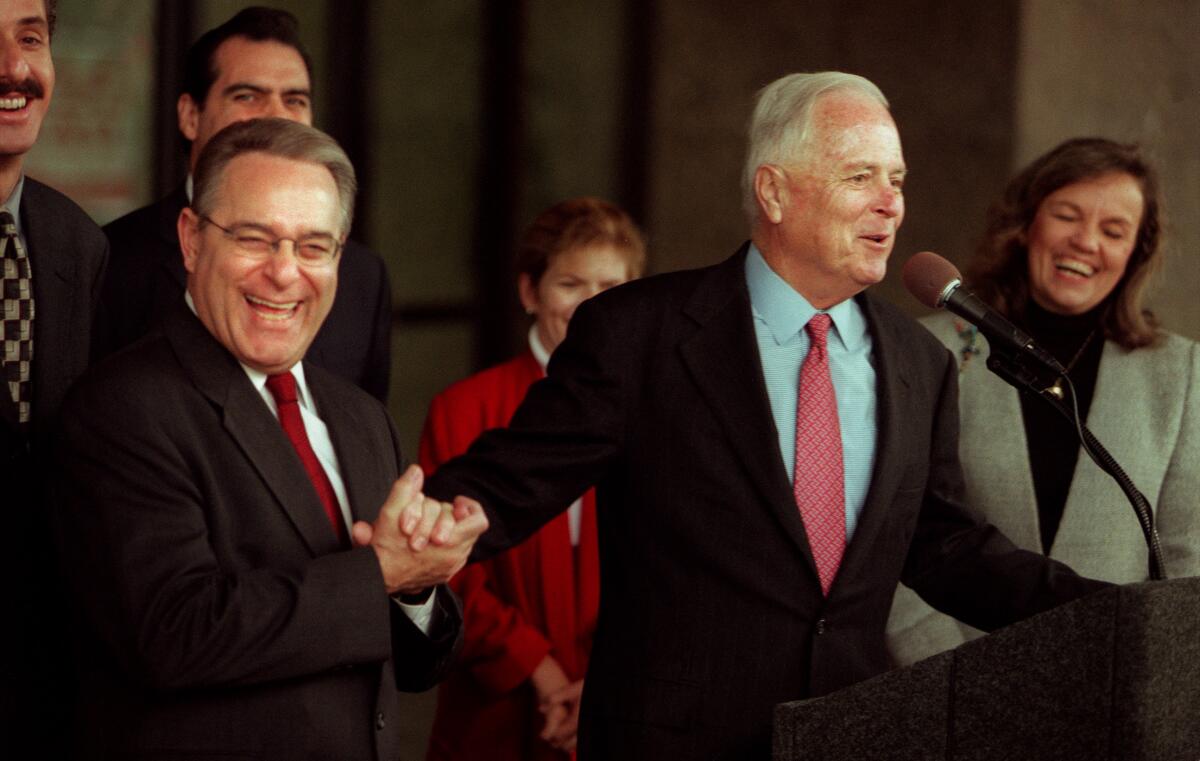
So now that last task (40,000 or so people living in tents and vehicles) will be in the hands of Bass or Caruso.
She’s steady, driven, affable, studious — you can imagine her having friends over to talk about the vagaries of government service realignment. And whereas Caruso has tossed $70 million or so into his own campaign without missing a nickel of it, Bass told me she needs the job to pay her mortgage.
He’s out of another era in sharp attire and bronze tan, and he moves as if he’s after something he knows he’s going to get. But it’s not an abrasive confidence. There’s charm there, and smarts, along with the skills of persuasion and a million-dollar smile. Make it a billion.
More than one observer told me the most important thing the next mayor needs to know is how to count to eight. It was something Riordan wasn’t so good at.
Former Councilmember Ruth Galanter explained what that means as she recalled the first budget cycle, when new Mayor Riordan expected to have his way with the 15-member council, not realizing that the necessary eight votes weren’t going to be handed to him on a silver platter.
“Riordan is Mr. I’m gonna get it done, I’m a businessman … and he essentially knew nothing,” Galanter said. So it had to be explained to the new mayor, she said, that “the council doesn’t work for you.”
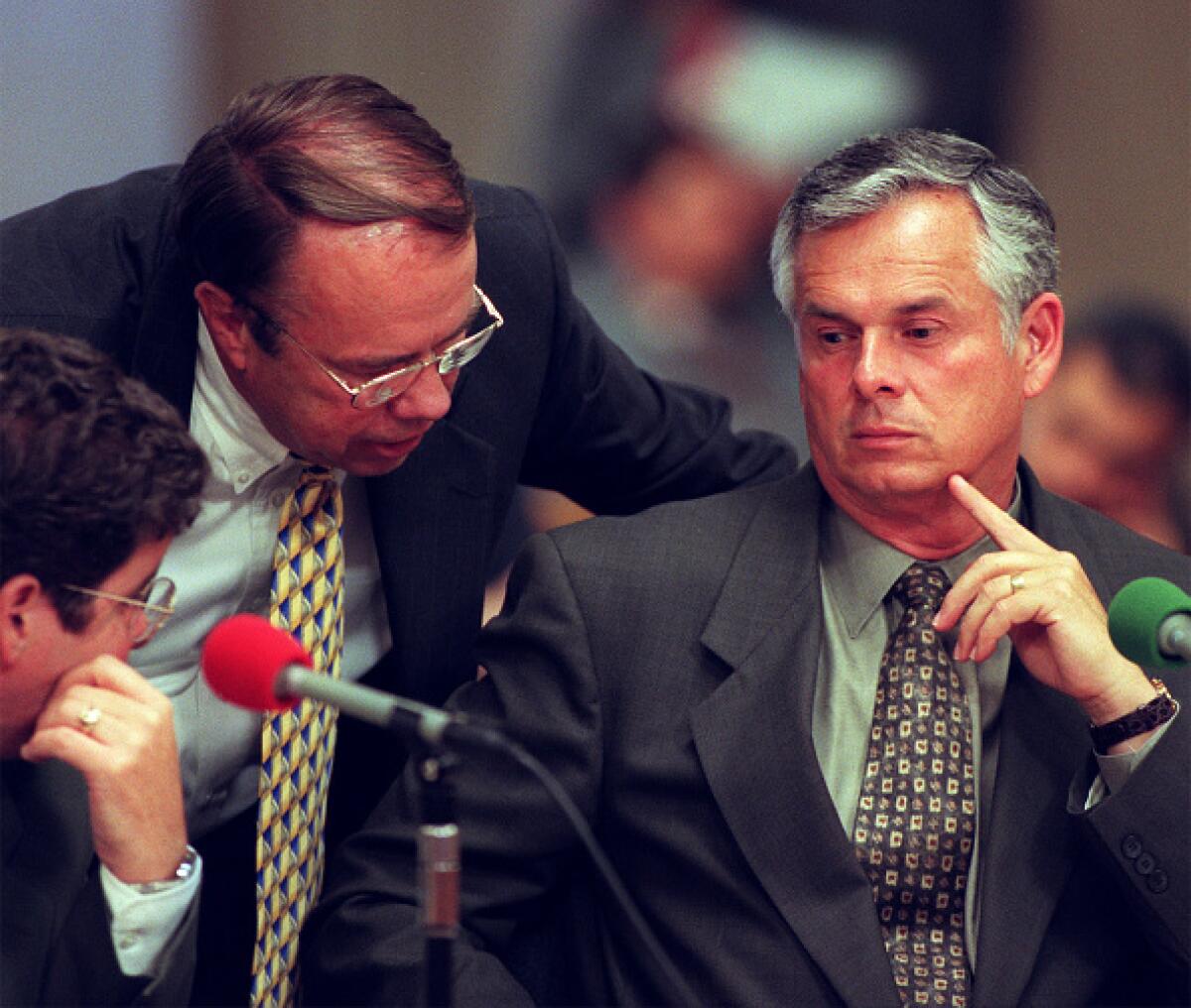
I mentioned this to Caruso during the primary and asked if he thought team-building might be difficult after his many references to City Hall as a corruption mill. He said he was only talking about pols who ended up in handcuffs, and he was not worried about finding allies.
Bass strikes me as someone less likely to set fire to the building. She has positioned herself as a consensus builder, with long-established relationships at every level of government.
“I think Bass has spent her career trying to figure out how to get things done through government, and that practical experience is under-valued,” said Sarah Angel, a political consultant who takes her kids to school in Hollywood and walks past homeless encampments. “But it is what makes the difference between getting families and kids to school safely and learning how to help people in crisis.”
And yet, as Caruso argues, Bass and others in office have had the opportunity to deliver and haven’t come through. I’d add one point: Building consensus is surely important, but Caruso supporters I hear from are frustrated, impatient and uninterested in a mayor who takes meetings. They want someone who takes action.
L.A. mayoral candidate Karen Bass says she expects ‘rocky road’ on homelessness but relishes the challenge.
To be honest, I admire each of them — Bass and Caruso — for coveting a wildly difficult job. The council is moving to the left of both of them, and there’s no telling what kind of relationship challenges they’ll have with the new city attorney and controller.
Labor will want what it wants, and developers, too, and many of the forces that drive homelessness are beyond the reach of a mayor. Then there’s the meth epidemic, and mental illness. And building consensus is even more complicated in a city Galanter called “ethnically, economically and ideologically diverse.”
Is L.A. even governable?
“It is,” said political consultant Dermot Givens, and there’s plenty of room for improvement. “It can be better governed with new leadership that wants to do the job and not continue with the status quo.”
That’s both Bass and Caruso, each of whom has a very-much-needed love of the city.
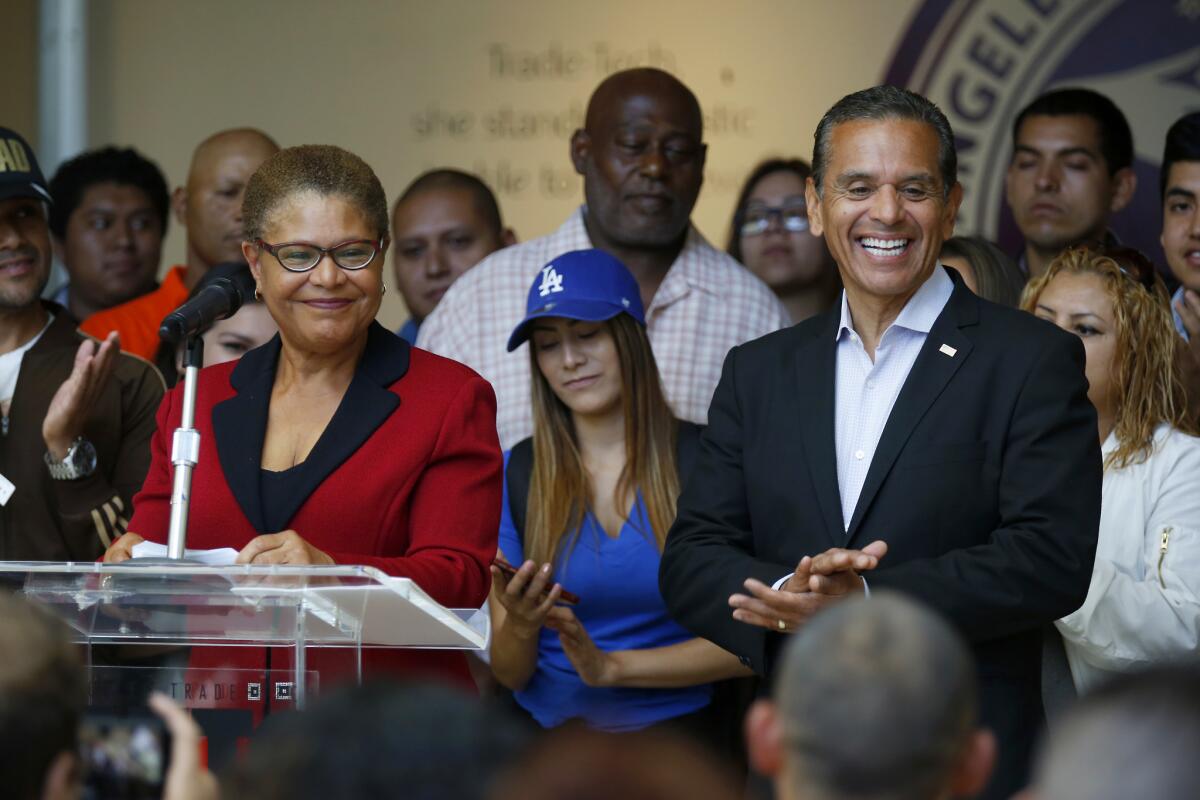
So did Villaraigosa, and when I asked what advice he cared to offer the next mayor, he didn’t hesitate. Here’s a sampling of his thoughts:
“When you’re mayor, you’re the most powerful guy in town but also the guy with the biggest lift. You gotta work people. It’s a schlepper’s job.”
“You gotta try things and do things that might fail.”
“You can not dictate, but if you collaborate, if you organize, if you’re someone who knows how to work in the sandbox with others, you can be very successful.”
“You’ve got to be connected to the community. … Particularly the communities that historically have felt like they’re not represented.”
One last thought from Villaraigosa:
“I knew Bradley and he loved his job and I think some people don’t. They think it’s a steppingstone. I think this is a job for people who really feel like, if you do nothing else, if this is all you ever do, God, what a great opportunity.”
steve.lopez@latimes.com
More to Read
Sign up for Essential California
The most important California stories and recommendations in your inbox every morning.
You may occasionally receive promotional content from the Los Angeles Times.

